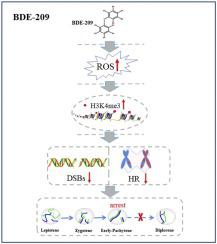Toxicology ( IF 4.8 ) Pub Date : 2021-12-20 , DOI: 10.1016/j.tox.2021.153061 Jinxia Zhai 1 , Wenfeng Geng 1 , Taifa Zhang 1 , Yu Wei 1 , Huan He 1 , Wenjing Chen 1

|
Deca-brominated diphenyl ether (BDE-209) is a common flame retardant utilized in electronic products, textiles, furniture, and upholstery materials. Environmental BDE-209 exposure results in spermatogenesis disorder, because of the characteristics of bioaccumulation, persistence, and probably toxicity. Meiotic prophase I is a crucial phase during spermatogenesis which is a key influential factor of normal sperm production. However, the effects of BDE-209 on meiotic prophase I during spermatogenesis are poorly understood. The present study aimed to evaluate whether BDE-209 exposure impairs meiotic prophase I during spermatogenesis of spermatocytes. We validated the effects of BDE-209 on alternations of meiotic prophase I in Balb/c male mice. Firstly, we analyzed sperm quality in cauda epididymis with decreasing sperm count, increasing abnormal sperm, and male reproductive dysfunction after exposure to BDE-209. Then, reactive oxygen species (ROS) and malondialdehyde (MDA) levels in testis and GC-2spd cells were significant increased after treated with BDE-209. Furthermore, we found that meiotic prophase I arrest at early-pachytene stage during spermatogenesis with increasing of DSBs damage and trimethylated histone H3 at lysine-4 (H3K4me3) in spermatocytes exposed to BDE-209. Finally, we conducted homologous recombination (HR) analyses to identify the progression of meiosis. The recombination markers, including DMC1 and RAD51, and crossover marker MLH1 were decreased during spermatogenesis after exposure to BDE-209. Collectively, our data indicated that BDE-209 has detrimental impacts on meiotic prophase I of spermatocytes in mice.
中文翻译:

BDE-209 诱导小鼠精母细胞在减数分裂前期 I 的粗线期早期停滞
十溴二苯醚 (BDE-209) 是一种常见的阻燃剂,用于电子产品、纺织品、家具和室内装饰材料。由于 BDE-209 的生物蓄积性、持久性和可能的毒性,环境接触会导致精子生成障碍。减数分裂前期I是精子发生过程中的关键阶段,是正常精子产生的关键影响因素。然而,BDE-209 对精子发生过程中减数分裂前期 I 的影响知之甚少。本研究旨在评估 BDE-209 暴露是否会损害精母细胞精子发生过程中的减数分裂前期 I。我们验证了 BDE-209 对 Balb/c 雄性小鼠减数分裂前期 I 交替的影响。首先,我们分析了附睾尾部的精子质量,发现接触 BDE-209 后,精子数量减少,异常精子增加,男性生殖功能障碍。然后,用 BDE-209 处理后,睾丸和 GC-2 spd细胞中的活性氧 (ROS) 和丙二醛 (MDA) 水平显着增加。此外,我们发现,随着暴露于 BDE-209 的精母细胞中 DSB 损伤和赖氨酸 4 处三甲基化组蛋白 H3 (H3K4me3) 的增加,减数分裂前期 I 在精子发生过程中的早期粗线期停滞。最后,我们进行同源重组(HR)分析以确定减数分裂的进展。暴露于 BDE-209 后,重组标记物(包括 DMC1 和 RAD51)以及交叉标记物 MLH1 在精子发生过程中减少。总的来说,我们的数据表明 BDE-209 对小鼠精母细胞减数分裂前期 I 具有不利影响。


















































 京公网安备 11010802027423号
京公网安备 11010802027423号